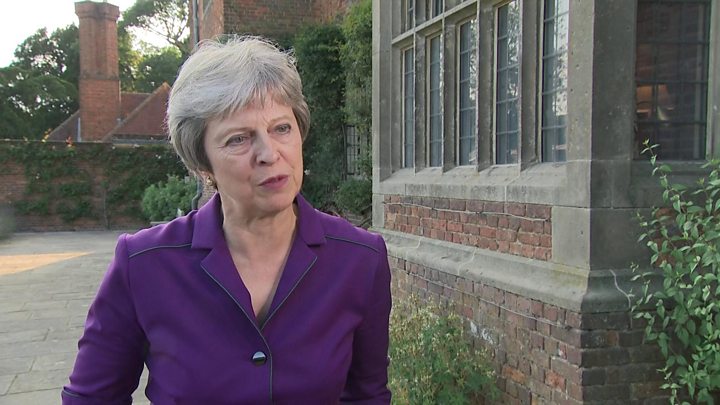
The cabinet has reached a "collective" agreement on the basis of the UK's future relationship with the EU after Brexit, Theresa May has said.
Ministers have signed up to a plan to create a free trade area for industrial and agricultural goods with the bloc, based on a "common rule book".
They also backed a customs model No 10 said would be "business friendly".
The BBC's Laura Kuenssberg said the plan, agreed after a 12-hour meeting, would "anger many Tory Brexiteers".
Our political editor said No 10 hoped the new commitments would unlock the next phase of talks with the rest of the EU but it was not year clear how many, or what kind, of objections were raised.
Downing Street said the proposals marked a "substantial evolution" in the UK's position and would resolve outstanding concerns about the future of the border between Northern Ireland and the Republic of Ireland.
"This is a proposal that I believe will be good for the UK and good for the EU, and I look forward to it being received positively," Mrs May told the BBC.
The UK said it now wanted to accelerate the negotiations in an effort to secure an agreement by October, but also warned it will step up preparations for leaving on 29 March 2019 without a deal.
The EU's negotiator Michel Barnier has suggested the EU would be willing to shift its position if the UK relaxed some of its "red lines", but has warned anything that "damaged" the single market would not be acceptable.
The prime minister had gathered her 26 cabinet ministers together at her country residence to try and resolve differences over the shape of the UK's relations with the EU and break the current deadlock with the EU.
The main details of the "Chequers statement" are as follows:
- The UK would accept continuing "harmonisation" with EU rules on the trade in goods, covering only those necessary to ensure frictionless trade
- Parliament would have the final say over how these rules are incorporated into UK law, retaining the right to refuse to do so
- There will be different arrangements for trade in services, including financial products, with greater "regulatory flexibility" and "strong reciprocal arrangements"
- Freedom of movement as it stands will come to an end but a "mobility framework" will ensure UK and EU citizens can continue to travel to each other's territories and apply for study and work
- A new customs arrangement will be phased in, with the goal of "a combined customs territory"
- The UK will be able to control its own tariffs and develop an independent trade policy
- The jurisdiction of the European Court of Justice will end but the UK will pay regard to its decisions in areas where common rules were in force.
Mrs May said this was an "important step" in the process of negotiating the UK's smooth exit from the EU.
"Of course we still have work to do with the EU in ensuring that we get to that end point in October. But this is good we have come today, following our detailed discussions, to a positive future for the UK," she said.
She said the proposals, to be formally published in a white paper next week, would give the UK the freedom to strike trade deals with other countries while maintaining regulatory, environmental and consumer standards.
There is no mention in the document of either the single market or the customs union, which the UK has committed to leave after the end of a transition period in December 2020.
Under plans for a free trade zone, the UK would be committed legally to following EU law for a large part of the economy, including manufacturing and farming.
While Parliament would retain the right to diverge from EU regulations in these areas, the document makes clear that "choosing not to pass the relevant legislation would have consequences for market access, security co-operation or the frictionless border".
The document also commits the government to step up preparedness for a no-deal scenario, as one of a range of possible outcomes, "given the short period remaining before the necessary conclusion of negotiations".